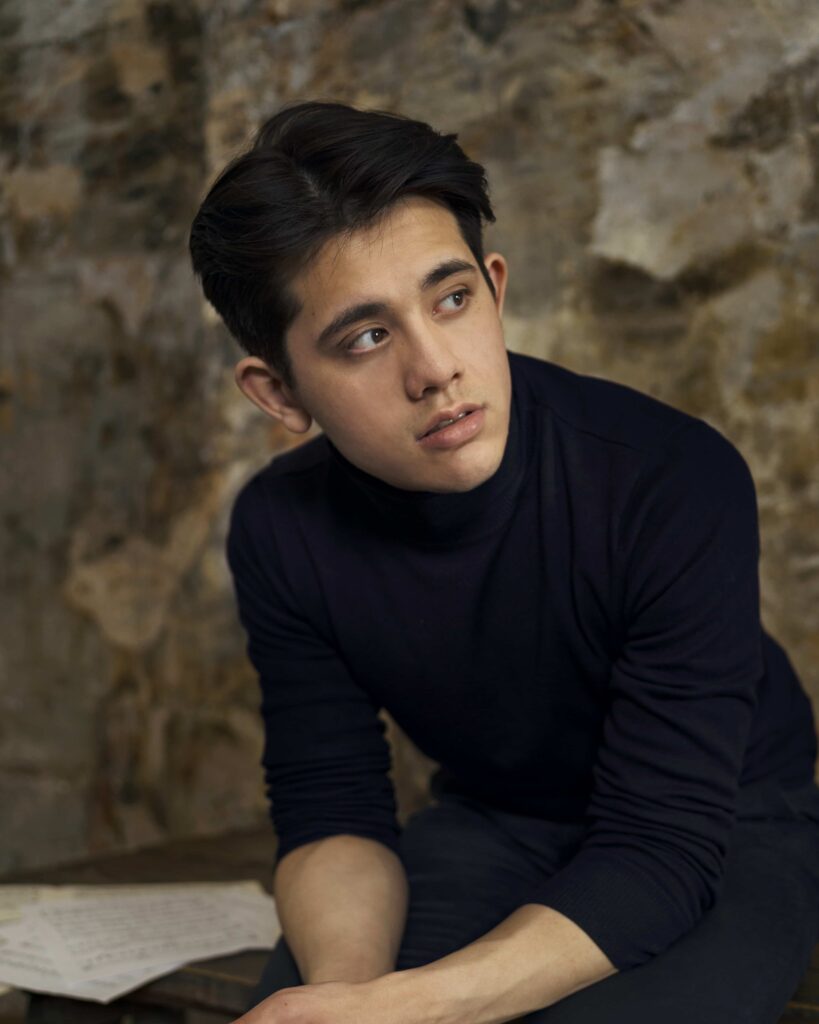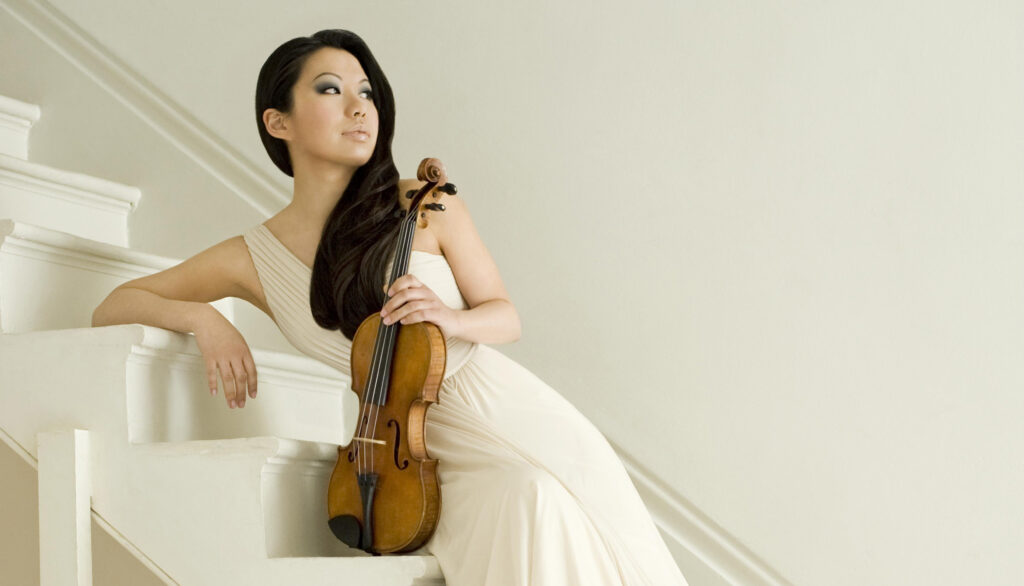A fresh-faced, miniature figure steps onto the stage at Philadelphia’s Academy of Music, facing her first audience of 2,500 people. She feels like she is playing dress up in her brand new outfit and shoes gifted by her parents. Her chubby five-year-old hand clutches the neck of the violin as she swiftly plays her solo performance of Mozart’s Concerto No.3. However, she was not alone. Her journey to the stage was supported by her parents, as well as teachers Dorothy DeLay and Isaac Stern.
“I was very young when I started going to Juilliard; I was only six,” she says. Being surrounded by talented individuals made her feel supported: “Having an amazing teacher and being in that environment, that was really the biggest motivator.”
That was Sarah Chang, a determined young prodigy who has grown to be a 42-year-old solo violinist. Since this carefree performance, Chang has become more serious as a classical musician: “Once you start having concerts scheduled, you have to go up on stage and it’s your name, it’s your fingers and it’s your heart up there. You feel a certain responsibility then.”
On the day of her New York pre-debut, her parents strode along the hallway, pacing restlessly. As an eight-year-old, Chang decided space was what she needed to focus on practise in the midst of pressure and panic. “It was quite funny that they were so nervous, because I remember being in a dressing room and I was just warming up and getting dressed. I literally had to kick them out to practice because I said, ‘You’re not helping’,” she says.
Read: Ella Taylor: Challenging misconceptions
Read more from our unheard voices here
Professor Gary McPherson from the University of Melbourne, author of Musical Prodigies, describes child prodigies as those younger than 10 who perform with adult professionalism. He believes they have the right to determine their life, regardless of their age. “We have to be so careful about such fragile little individuals, we’ve got to allow them to grow and reach their personal best,” he says. “They’re in control of their learning rather than the learning being controlled by others.”
Although parents play a huge part in catering to young prodigies’ emotional needs, young musicians should have the power to make their own choices. “Every concert that I gave and every recording I was making, I had agreed to,” Chang says. “Whether it’s your parents or managers, always remember that your management team, they work for you. If your vision isn’t exactly what they see for you then find people who are on board because at the end of the day, it’s your life.”
Being autonomous is important, especially when it comes to choosing the right musical avenue. Focusing on a specific area in the industry can direct the trajectory of the child’s future. “There are different paths that you can take in the music industry,” says Chang. “The repertoire that you need to learn is so different that getting started as early as you possibly can is imperative.”

The repertoire that you need to learn is so different that getting started as early as you possibly can is imperative
Sarah Chang
McPherson believes children should be allowed the freedom to grow and develop the strength to persist from setbacks. “It often goes wrong, breaks down and children have mental health problems when the style of teaching is too authoritarian,” he says.
Chang, as well as being looked after by her hands-on parents, was protected by certain laws as a child. When she was 13 and working on a live recording with an Amsterdam concerto, child labour services inspected her working hours: “They had their stopwatches, saying ‘She can’t work beyond midnight’ because then they get into all these child labour laws. And I remember saying no, I want to finish this tonight.”
Mendelssohn’s Violin Concerto sounded through the strings as Chang played the piece with beauty, expression and power well beyond her years. Between the melodies, her six-year-old fingers confidently worked through the chords. DeLay stood there in awe: she’d never heard anything like it before.
“Dorothy was very gentle and very encouraging. She never said things like, ‘Oh, you’re playing out of tune.’ She never ever criticises you in that traditional way,” Chang says. “You’d play through a piece, and she would ask you, ‘How do you think that went, honey?’”
However, some pressure is necessary for growth as a young musician, as Chang discovered through Isaac Stern’s teaching. It enabled her to detach herself from off-stage compliments and actively improve as a musician. “Isaac Stern has a famous quote where he says there has to be someone pushing. Sometimes they do it horribly, sometimes they do it with great care. It’s the quality of the pushing that’s important,” says McPherson.
Read: ‘I so passionately care about both aspects of my life’
Read more from our unheard voices here
Stern, the cooler opposite of DeLay, was Chang’s second teacher when she reached seven. Whenever Chang played out of tune, Stern pointed it out immediately. He humbled her with the truth and brought her right back to earth. “It was literally like a cold shower,” she says. “He made sure I was working on my basics, my scales and the exercises, to make sure that the foundation was secure.”
Apart from musical education, school is an important asset to a child prodigy. “I remember my parents would be taking meetings with agents, managers or recording execs and I would be sitting there thinking ‘I have maths homework’,” she says. She also recalls a six-week European tour where she had to travel with her tutor and do two hours of homework in the hotel room post-concert, every night.
George Harliono, a 21-year-old concert pianist and also a child prodigy, chose homeschooling at age 13 instead. “The school had expectations for my exam results and if I was travelling a lot, I wasn’t able to meet them,” he says. There were pros and cons to this decision: although he didn’t have as many friends from school, he was able to fit in more hours of practice and even attended the Royal College of Music at age 16.
“I didn’t want to have any regrets about not going in for my music career so I did what I did,” he says. From his 11-year-old recordings of Beethoven’s Piano Sonata No.1 in London, to his live broadcast of Tchaikovsky’s Piano Concerto No.1 in Russia, Harliono has reached global audiences with his fingertips.
His family jokes about the time he spent on his favourite pieces, playing hours of Romantic repertoire and 20th-century concertos. “In the past, my mother has said if I had spent the time that I practised piano studying medicine, then I would probably already be a doctor,” he says. Although his music career is time-consuming, he wouldn’t trade it for anything: “It would have been more financially rewarding to go into a different career but in terms of my passion, music is something that I couldn’t live without.”
Without them, I wouldn’t be where I am today
George Harliono

“The most important people have always been my teachers and my family,” Harliono says. Having an upright Yamaha piano at 11, he expresses his gratitude to his parents. Whenever he had a piano lesson in London, his parents would drive him to train stations and ensure he caught his train. Or when he travelled to various countries for concert performances, they would fly with him.
Harliono has been driven by his passion for the piano since his youth, leading him to pursue music in the long term. From messing about on an untuned piano back at home with his brother to playing behind closed doors of a church in Cambridge, Harliono refuses to let a piano gather dust. His enthusiasm for the instrument brought him to his first solo recital at age nine and the Tchaikovsky Competition in Moscow when he was 15.
The lifelong career of a child prodigy is an individual achievement but also a collaborative team effort. “Having the support from your family is something that is invaluable as a young musician,” Harliono says. “Without them, I wouldn’t be where I am today.”

